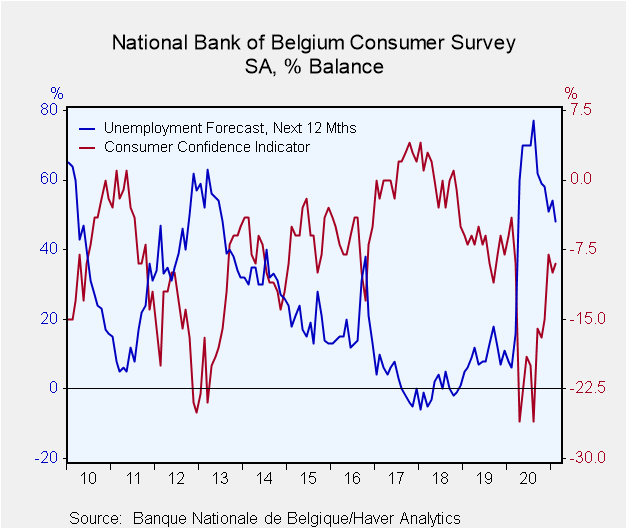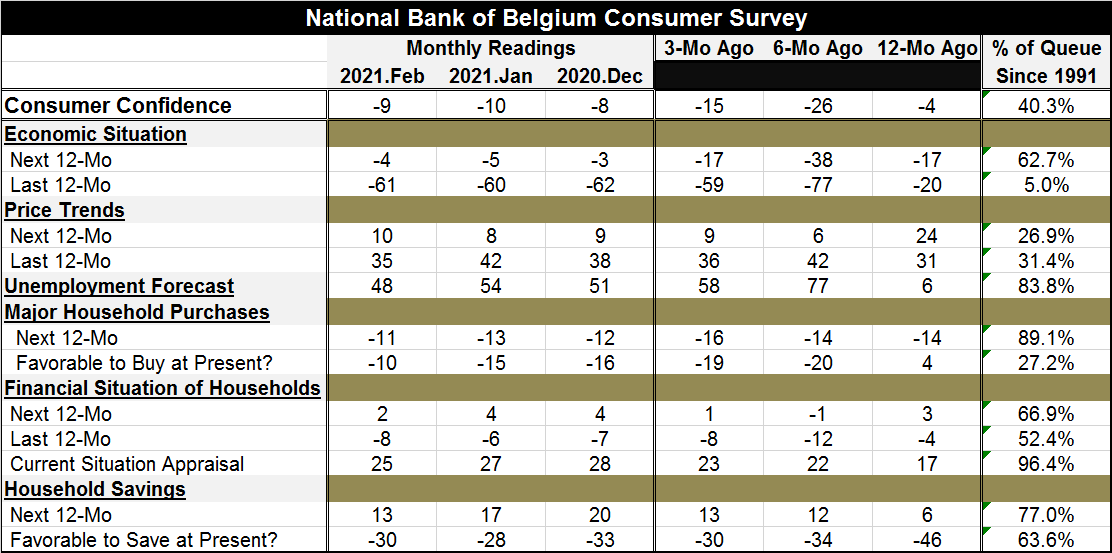 Global| Feb 18 2021
Global| Feb 18 2021Belgian Confidence Ticks Higher
Summary
While Belgian confidence ticked higher in February, it remains with a net negative reading and is still largely exceeded by all previous values from 2013 forward. Evaluated versus data since 1991, the Belgian confidence headline [...]
 While Belgian confidence ticked higher in February, it remains with a net negative reading and is still largely exceeded by all previous values from 2013 forward. Evaluated versus data since 1991, the Belgian confidence headline resides in is 40.3 queue percentile leaving it some 10 percentile points below its median on that timeline. The headline value improved to -9 in February from -10 in January and compares to a value of -4 one year ago when Europe was on the brink of being overrun by the virus.
While Belgian confidence ticked higher in February, it remains with a net negative reading and is still largely exceeded by all previous values from 2013 forward. Evaluated versus data since 1991, the Belgian confidence headline resides in is 40.3 queue percentile leaving it some 10 percentile points below its median on that timeline. The headline value improved to -9 in February from -10 in January and compares to a value of -4 one year ago when Europe was on the brink of being overrun by the virus.
Currently Belgium seems to have the virus at bay. Its second wave of infections peaked sharply in October of last year at 23,931 per day near month-end. Then the infection rate fell sharply to around 3,500/day by end-November and that infection rate has stayed around 3,000 per day ever since. The current profile seems to be moving even lower.
The deaths curve for Belgium has also continued to slide. Its early-November peak briefly surpassed it early-April value, but the heart of its death count largely remained below what had been seen in April 2020. The death count has continued to erode steadily and at about 48 per day while it is still above its late summer low points but it is still trending lower.
So the virus does not seem to be a negative factor anymore in the assessment of the Belgian economy or its growth prospects…unless, of course, there is a flare up. But Belgium has held infections in this low profile for about a month and one half now.
Belgium's consumer assessment of the next 12 months at -4 is only in line with the past two months, but that is sharply better than its reading of -17 twelve-months ago. The reading for the last 12-months (a current assessment, looking backward) is also stable at -61 and that is sharply worse than it had been one year ago when it was at -20.
Price trends for the next 12 months have ticked higher in February to 10 compared to 8 in January and 9 in December; this value is substantially below the reading of 24 for 12-months ago. The inflation assessment of the previous 12-months is now a bit lower than it was in January and December but is only slightly lower and not substantially different from 6- and 12-months ago.
The unemployment forecast is improved for February compared to the two previous months, but that is still dramatically higher (eight time higher!) than it was one year ago.
The buying environment for the 12-months has been gradually improving. The assessment that it is a favorable time to buy has improved in the last two months and over the last six months generally- but it is much less positive than it was 12-months ago.
Households rate their financial conditions as nearly unchanged over the last two months as well as back 12-months ago. The sense of improvement here is lacking. The household financial situation in the last 12-months is assessed more or less about the same back to 12-months ago. The appraisal of the current situation is better than 12-months ago, but it has deteriorated from December to January to February.
The prospects for household savings are decidedly lower over the next 12-months as assessed in February compared to January and December, but they are improved from one year ago. The environment is considered more hospitable for savings than it was a year ago, but that improvement may not be ongoing as the February assessment is worse than the December assessment, but is up from January.

On balance, Belgium is striking for its apparent relative freedom from virus issues. However, Belgium is not free of restrictions. Belgian's, in fact, have been chaffing to get restrictions lifted. ‘The Bullet' reports this:
"So what were the three most complained-about coronavirus rules? The closure of the hospitality industry (cafes, restaurants, private functions etc), the requirement to wear a mask and the restrictions on religious services. To date, 104 judgments have been delivered. Only three have ended up in the claimant's favour: the increase from 10 to 15 worshippers at church services, the reopening of campsites and holiday resorts, which had successfully argued unfair discrimination compared to the hotel industry, and the City of Brussels' ban on prostitution, which the court ruled was beyond the remit of a local mayor" (Source here).
From this it is clear that many restrictions are still in place in Belgium and few complaints (only 3 out of 104 under an expedited process) have been overturned in favor of the plaintiff. Belgium is doing better against the virus partly because it has restrictions in place. While it is not fighting an outbreak as other countries and regions have been, its policymakers are fighting to keep anti-pandemic restrictions in place to keep infections at bay. This explains why in the face of declining and low infections and a sliding death toll the Belgian economy is improving but only at a very modest pace.
Commentaries are the opinions of the author and do not reflect the views of Haver Analytics.Robert Brusca
AuthorMore in Author Profile »Robert A. Brusca is Chief Economist of Fact and Opinion Economics, a consulting firm he founded in Manhattan. He has been an economist on Wall Street for over 25 years. He has visited central banking and large institutional clients in over 30 countries in his career as an economist. Mr. Brusca was a Divisional Research Chief at the Federal Reserve Bank of NY (Chief of the International Financial markets Division), a Fed Watcher at Irving Trust and Chief Economist at Nikko Securities International. He is widely quoted and appears in various media. Mr. Brusca holds an MA and Ph.D. in economics from Michigan State University and a BA in Economics from the University of Michigan. His research pursues his strong interests in non aligned policy economics as well as international economics. FAO Economics’ research targets investors to assist them in making better investment decisions in stocks, bonds and in a variety of international assets. The company does not manage money and has no conflicts in giving economic advice.






